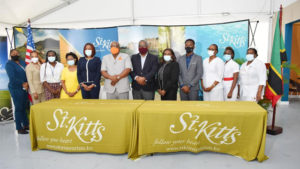 With the arrival of the first tranche of the Pfizer Covid-19 vaccines, on Thursday August 12, Prime Minister Dr the Hon Timothy Harris has said that this gives the country more choices as adolescents could get their own protection by getting vaccinated.
With the arrival of the first tranche of the Pfizer Covid-19 vaccines, on Thursday August 12, Prime Minister Dr the Hon Timothy Harris has said that this gives the country more choices as adolescents could get their own protection by getting vaccinated.
“I am happy that we have received the Pfizer vaccines, and our health professionals here could perhaps say more about what is special and unique with regard to the Pfizer vaccines,” said Dr Harris at the ceremony held at the Welcome Centre of the RLB International Airport after 11,700 Pfizer Covid-19 vaccine doses were received from the United States of America.
“What I do know is that it brings more choices to our people – something we had hoped for, longed for, and worked hard for, and we are now seeing the fruits of our labour,” the Honourable Prime Minister noted. “And we are receiving this additional option in the face of limitations and the availability and accessibility of Covid-19 vaccines around the world, with the developing world being put at a disadvantage.”
Dr Harris, who also has lead responsibility for Human Resource Development, Health and HIV/AIDS issues in the CARICOM’s quasi-cabinet and who had written to US President Joe Biden as part of CARICOM’s high level diplomacy when requesting for the vaccines, said it was significant since the Pfizer vaccine had also been used to vaccinate people above age 12.
“At present in our country only persons 18 and over were able to access the AstraZeneca vaccine,” he reminded. “The continuity of the trials and the science have now revealed that it is safe for the Pfizer vaccine to be used to vaccinate adolescents. This then is a tremendous benefit since our children can now have their own protection rather than relying on vaccinated adults for their protection.”
Presently in the country there are 13,021 persons under 18 according Dr Harris, while 4,810 persons which is 10.2 per cent of the country’s population are between the ages of 12-17. He therefore pointed out that the country now has a new pool of 4,800 persons who can be vaccinated and add to the general protection, health and safety of St. Kitts and Nevis.
“This then of course will make a significant difference,” he said. “It means that our secondary schools in St. Kitts and Nevis can be put in a safer position when schools reopen in September this year. The disruption earlier this year of all our schools, including our secondary schools because of Covid-19 is now less likely to reoccur and our children can enjoy in classroom learning. Their tomorrow will be much brighter than their yesterday and their today because we now have the Pfizer vaccine.”
There are people elsewhere who have advocated that if the in classroom setting is no longer available, then people must go to the technology, which represents an imperfect alternative for the in classroom setting and learning.
It was pointed out that the online or virtual experience creates greater inequality in participation in learning, as those who are from richer families can access the technology, while those who are from poorer families would have difficulties and that has played itself out in America and in the United Kingdom.
He told the gathering which included the Minister of Health the Hon Akilah Byron-Nisbett, the Attorney General the Hon Vincent Byron Jr. and Chief Medical Officer Dr Hazel Laws among others, that with the Pfizer vaccine, which will be available to students in the country’s secondary schools students will now be able to continue with the in classroom experience, adding, “We want our children to be safe, we want them to be protected, and we want them to be properly educated.”
The Honourable Prime Minister reaffirmed: “My administration is committed to delivering a stronger safer future, and to do so we must protect all our people, and in our part of development, and in the organisation of our country, we have always paid special attention to young people, to the elderly, to the vulnerable. We can do this now much more effectively with the Pfizer vaccine.”
